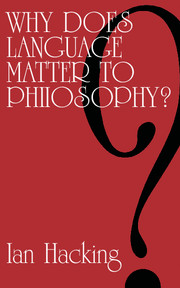
-
Select format
-
- Publisher:
- Cambridge University Press
- Publication date:
- 05 November 2012
- 26 September 1975
- ISBN:
- 9780511627873
- 9780521099981
- Dimensions:
- Weight & Pages:
- Dimensions:
- (216 x 138 mm)
- Weight & Pages:
- 0.213kg, 212 Pages
- Subjects:
- Philosophy of Mind and Language, Philosophy
You may already have access via personal or institutional login- Subjects:
- Philosophy of Mind and Language, Philosophy
Book description
Many people find themselves dissatisfied with recent linguistic philosophy, and yet know that language has always mattered deeply to philosophy and must in some sense continue to do so. Ian Hacking considers here some dozen case studies in the history of philosophy to show the different ways in which language has been important, and the consequences for the development of the subject. There are chapters on, among others, Hobbes, Berkeley, Russell, Ayer, Wittgenstein, Chomsky, Feyerabend and Davidson. Dr Hacking ends by speculating about the directions in which philosophy and the study of language seem likely to go. The book will provide students with a stimulating, broad survey of problems in the theory of meaning and the development of philosophy, particularly in this century. The topics treated in the philosophy of language are among the central, current concerns of philosophers, and the historical framework makes it possible to introduce concretely and intelligibly all the main theoretical issues.
Contents
Metrics
Altmetric attention score
Full text views
Full text views help Loading metrics...
Loading metrics...
* Views captured on Cambridge Core between #date#. This data will be updated every 24 hours.
Usage data cannot currently be displayed.
Accessibility standard: Unknown
Why this information is here
This section outlines the accessibility features of this content - including support for screen readers, full keyboard navigation and high-contrast display options. This may not be relevant for you.
Accessibility Information
Accessibility compliance for the PDF of this book is currently unknown and may be updated in the future.


